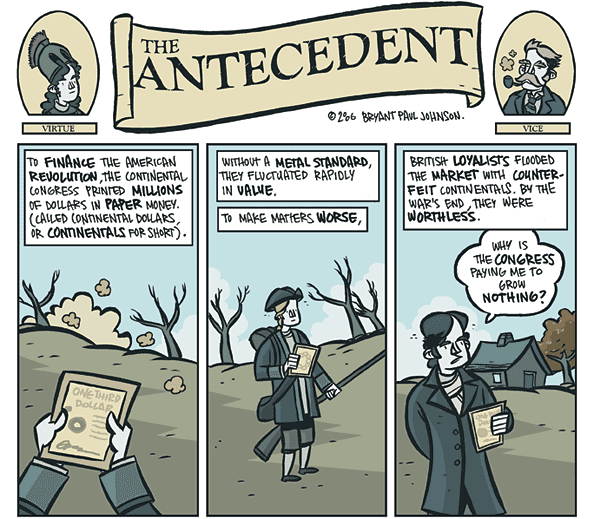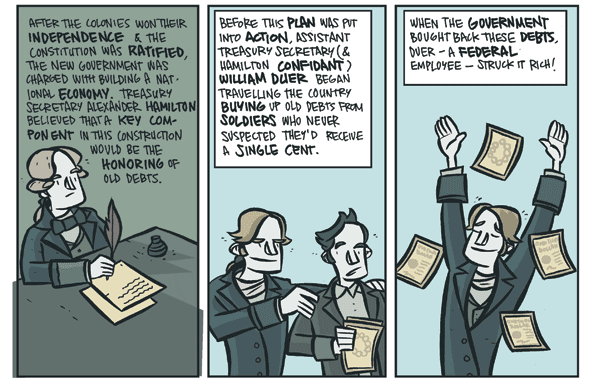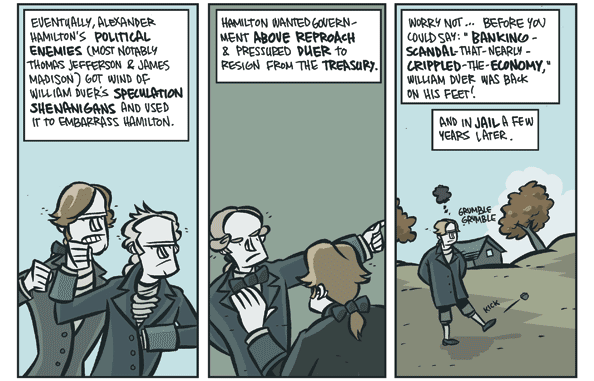


Endnotes
Continental Dollars were issued in several of the colonies by regional banks. They were big, square and sort of creepy (the 1/3 dollar bill bearing the ominous motto: “Mind your Business;” you’ve got to hand it to the Americans, we’re good at creating creepy mottoes; take for example the motto originally proposed by Benjamin Franklin for the three dollar bill: “the outcome is in doubt;” really makes you brim over with patriotic pride). They were also filled with imagery sure to send conspiracy nerds scrambling for their copies of “The Illuminatus Trilogy.” Some of the designs were created by none other than silversmith and horse aficionado Paul Revere, famous for inspiring the band Paul Revere and the Raiders.
The Continental Congress was the governing body of the American colonies before the Constitution was ratified and the new government took over in 1789.
A metal standard is a reserve of gold or silver used to back up the value of paper currency. Paper bills backed by a standard may be exchanged for their value in silver or gold, preventing rapid fluctuations in their worth. Because the Continental Dollar was backed by the promise of future tax revenue (a certainty only if the colonies were successful in their insurgency), and not by a physical store of precious metal, every change in fortune threw the Continental into flux. Today, we’ve evolved beyond the need for an actual reserve of gold (or silver). Our currency is once again tacked to the promise of future revenue. And once again, it is in flux. I’m not particularly worried, but then again, I’ve filled my basement with bars of silver, drinking water and shotgun shells.
During the Civil War, the Confederate States of America found a similar fate: their currency was pegged to future revenue (and some stores of precious metal), but was constantly driven down by Union attacks on the Southern economic infrastructure. Without a means of viable foreign trade (made increasingly difficult by the Union blockade of Southern ports) the Confederate dollar was pretty much a unit of internal barter. As supply decreased, demand increased, and the value of the Confederate dollar plummeted. By the end of the Civil War, Confederate currency was valuable only as insulation.
Because of the simple design of the Continental, and that it could be issued by any number of banks, counterfeiting was a serious problem. British loyalists and agents created hundreds of thousands of dollars in fake currency, driving the value of the real dollar down. Jerks. That they bribed farmers and laborers to cease work is a matter of speculation. But not the type of speculation that this comic is about. Unless someone is running odds. Are you? 4 to 1 against the accuracy of this comic.
Alexander Hamilton believed there were several keys to the successful creation of a federal economy. By honoring foreign and domestic debts in their entireties (including debts owed to England), he hoped to build American credit in foreign markets. The United States in the late 18th century was just a speck in the global economy. If it wished to ever compete with European superpowers, it needed credit beyond its meagre production. Hamilton advocated the purchase of all state debts (debts owed by each state for the cost of the revolution) and debts paid to soldiers and laborers.
William Duer was born a Briton, but partook in the American Revolution wholeheartedly. He was an important part of the Revolutionary government, and a valuable thinker in the Contitutional debate. In September of 1789, Hamilton named Duer his Assistant Secretary of the Treasury in George Washington’s newly created cabinet. Duer was a confidant of Hamilton from his earlier years in the Colonies. He was undoubtedly influential in the creation of Hamilton’s economic plan, unveiled in 1790.
Duer was one of several speculators who travelled the country purchasing Revolutionary debts. Most of those owed monies assumed that they’d never see any return. There had been several unsuccessful veteran marches on the government demanding payment, with no result. When Duer and his ilk began offering some money for their debts (pennies on the dollar) many gladly accepted. Of course, had they been privy to the things that William Duer knew, they’d likely have held out a little longer.
Duer wasn’t the first to think of this scheme. In building the new economy, Alexander Hamilton was quite forthcoming with members of the business aristocracy (a figurative aristocracy, not a literal one). Many assumed that the honoring of old debts was in the future; what makes this particularly galling is that William Duer knew for certain.
Alexander Hamilton found himself at odds with several prominent founding politicians in1789. Most notable amongst these were Thomas Jefferson and James Madison, both Virginians. Though Madison was one of the co-authors of the Federalist Papers with Alexander Hamilton, the process of Constitutional ratification had changed his views. Hamilton’s plan to assume state debts irked the two Virginians: Virginia — with its strong agricultural economy built on slavery — had long since paid back its share of debt, while the Northern states had not. In their view, Hamilton’s economic plans favored the North and penalized the South. They sought any leverage they could against Hamilton. When it became obvious that William Duer’s speculation would prove embarrassing (Northern businessmen taking advantage of veterans!), Hamilton pressured William Duer to resign. He did so in April of 1790, having served only eight months.
After leaving the cabinet, Duer continued his speculation. He still had contacts within the Treasury (even if his relationship with Hamilton was strained) and knew their still private economic plans. When he learned that Hamilton planned on creating a federal bank, he started speculating in bank shares. His actions (along with those of a few other businessmen) seriously undermined the security of federal bonds, nearly destroying the nascent economy in the process. Fearful that others would manipulate the economy in similar ways, the business community established certain self-policing policies that created the New York Stock Exchange. And Duer went to debtor’s prison.
Good times.
Recent Comments